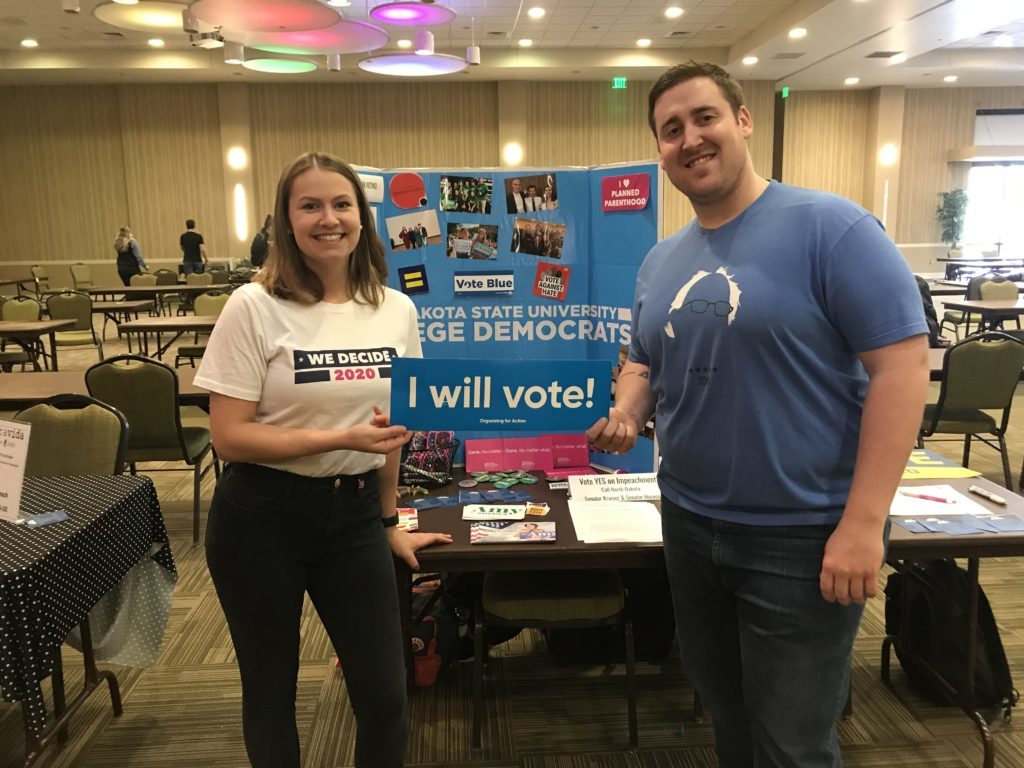
Taylor Spreeman | Photo courtesy
College Democrats tabled on campus to encourage students to vote.
When the Democratic caucus is set to happen in North Dakota
Fargo’s Democratic Caucus will happen on March 10 and will be held at the Fargo-Moorhead AFL-CIO office in downtown Fargo at 3002 1st Ave N, Fargo, ND from 11 a.m. to 7 p.m. North Dakota is the only state in which there is no formal voter registration system and voters do not need to register to a political party in order to vote at the caucuses.
Voters may vote in advance by mail until March 5 or vote in person in Fargo, Grand Forks, Bismark, Minot, Jamestown and nine other firehouse caucus locations across the state.
North Dakota State College Democrats have been tabling on campus and doing outreach on social media to promote voting while informing students of their voting options in North Dakota.
President of College Democrats, Taylor Spreeman, encourages young voters to take their voting power seriously by educating themselves and exercising their right to vote.
“The current elected officials are shaping our future yet won’t have to deal with the ramifications down the road, which is why it is crucial to make your voice heard through your vote,” Spreeman said.
“College students and young people are the future of our country and we believe it is imperative that students start caring about issues that affect their everyday lives and the direction of our country,” Spreeman said.
North Dakota is one of six states that uses a caucus system rather than a primary system. Caucuses are different than primaries in that they may require voters to go to a meeting to participate in the nomination process.
“College students and young people are the future of our country and we believe it is imperative that students start caring about issues that affect their everyday lives and the direction of our country.”
Taylor Spreeman, President of College Democrats
North Dakota’s caucuses use the design of firehouse caucuses, which is in-effect a party-run primary. Voters can show up to the caucuses and vote just as they would in a primary. To vote, a valid North Dakota ID or an ID and proof of residence is required.
Only four states have already held their primaries and caucuses: Iowa, New Hampshire, Nevada and South Carolina. On March 3, Super Tuesday, 14 more states including Minnesota will hold their own primaries to decide who receives their delegates. North Dakota has 13 delegates and caucuses on March 10 along with five other states including Michigan.
After the South Carolina primary on Saturday, March 1, three candidates, Mayor Pete Buttigieg of South Bend, Indiana, billionaire Tom Steyer and Senator Amy Klobuchar declared they were dropping out of the race. They did not believe they would be able to earn enough delegates to secure the Democratic nomination. Klobuchar dropped out on Monday and pledge her for support for Former Vice President Joe Biden.
After Buttigieg’s, Steyer’s, and Klobuchar’s announcement of withdrawal from the race, four leading candidates remain, being Sanders, Biden, Warren and Mike Bloomberg. In the South Carolina primary, Biden received 48.4 percent of the vote to Sanders’ 19.9 percent and Steyer’s 11.3 percent. Buttigieg, Warren and Klobuchar received 8.2 percent, 7.1 percent and 3.1 percent, respectively.
These candidates will remain on the ballot unless they choose to drop out after Super Tuesday, which will impact the candidates’ campaign chances. Biden and Sanders remain the leaders in the race and hope to capitalize on their momentum thus far.
Trump has received all but one of the 87 pledged delegates declared by Republicans. The Democratic Party has declared 149 delegates, with 58 going to Bernie Sanders, 50 for Joe Biden, 26 for Pete Buttigieg, eight for Elizabeth Warren and seven for Minnesota Senator Amy Klobuchar. Democratic candidates must earn 1,991 delegates in order to win the nomination.
